“There’s Something Very Special Here”
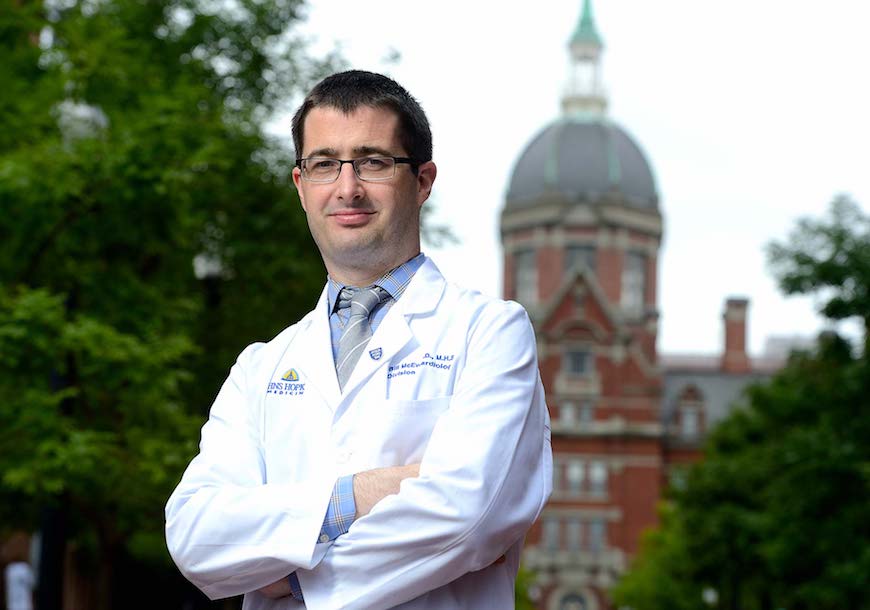
After losing two children to congenital heart defects, Irene Pollin made it her life’s mission to promote prevention strategies for those lucky enough to be born with healthy hearts. That mission drove her to make a $10 million gift to the Ciccarone Center for the Prevention of Heart Disease. Since then, the Pollin Preventive Cardiology Fellowship has allowed young researchers to conduct cutting-edge research, and the Kenneth J. Pollin Professorship in Cardiology has given Roger Blumenthal, MD (A&S ’81) a platform to influence policy and practice well beyond Johns Hopkins. “In an era of rising health care costs and expensive procedures, it’s important to do all we can to prevent heart attacks, strokes, and heart failure from happening, and that’s the essence of preventive cardiology,” says Blumenthal, the director of the Ciccarone Center for the Prevention of Heart Disease. Blumenthal and Pollin crossed paths more than a decade ago, when he volunteered to help provide heart-health screenings for women who were sponsored by Pollin’s Sister to Sister Foundation. The Kenneth J. Pollin Professorship — named for Pollin’s son who died just a year after birth — has given Blumenthal the ability to help develop policies and guidelines related to cardiovascular health. “When you’re a physician, seeing patients takes up a lot of time,” he says. “This endowed professorship has allowed me to have an impact on prevention far broader than I could have had just by seeing individual patients.” Pollin’s gift also allows Blumenthal to select promising cardiovascular fellows to attend the Bloomberg School of Public Health. These Pollin Preventive Cardiology Fellows can enroll tuition-free in Bloomberg’s master of science in health science program, which provides advanced training in areas that aren’t emphasized in medical school but which are critical for clinicians interested in academic cardiology and prevention research. “Roger’s mentorship and Irene’s generosity have created a world-class environment for young preventive cardiologists to get the training and experience they need to make a real impact, to generate knowledge that will improve prevention throughout the world,” says Bill McEvoy, MB BCh, MHS (SPH ’15), an inaugural Pollin Fellow. “There’s something very special here.”
We constantly hear about wars, conflicts, and health crises, and Elif’s legacy will carry on in the work of others who are helping in those situations.”
Elif’s Legacy Will Carry On
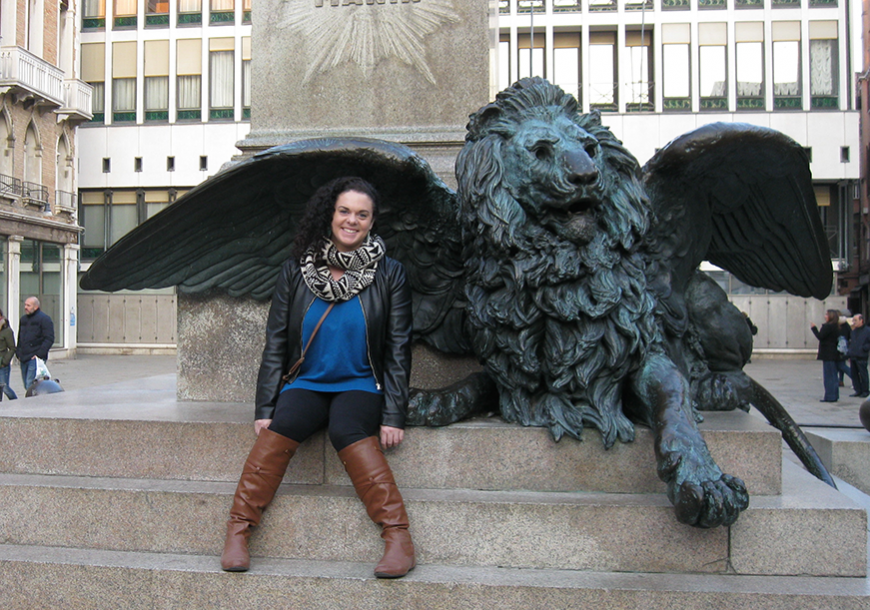
Elif Yavuz, MA (SAIS ’04), and her partner, Ross Langdon, were shopping at the Westgate Mall in Nairobi, Kenya, when al-Shabbab militants attacked the building. The couple, mere weeks from becoming parents for the first time, were among the 60 people killed during the siege. Today, a fellowship supports students with career and research interests similar to Yavuz’s. The fellowship was endowed by gifts from nearly 100 people — including from Yavuz’s fellow SAIS alumni and matching funds from Bob Hildreth, MA (SAIS ’75) — and supports a student with career and research interests similar to Yavuz’s: humanitarian assistance and public health in the developing world. “We constantly hear about wars, conflicts, and health crises, and Elif’s legacy will carry on in the work of others who are helping in those situations. These fellowships will help those people be ready for that work,” says Julie Hackett, MA (SAIS ’04), who helped raise funds for the fellowship alongside fellow alumni Camilo Tellez, MA (SAIS ’05), and Alexandra Jaeckh, MA (SAIS ’04). Hildreth, a former member of the Johns Hopkins SAIS Board of Advisors, pledged a $25,000 match gift to help achieve the initial fundraising goal of $50,000. When donors met that challenge, Hildreth pledged a second $25,000, and the fellowship reached the $100,000 endowment threshold shortly thereafter. “We wanted to fund this in a way that would bring together as many people in her class together as possible,” Hildreth says. “This was a cause driven, really, by her classmates.”
Always Helping Others
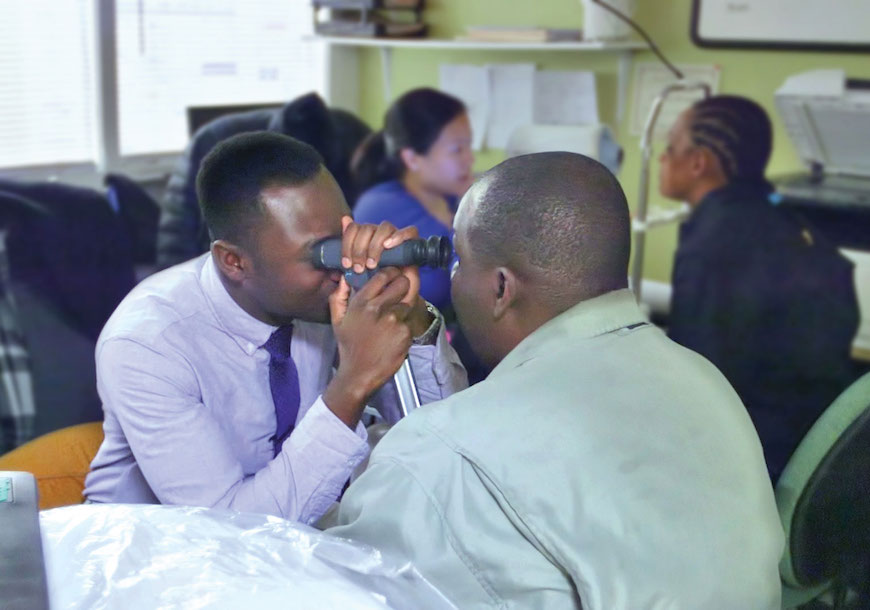
For Derick Ansah, Class of 2020, service is a way of life. The School of Medicine student was inspired to become a doctor while helping wounded warriors at Walter Reed National Military Medical Center. And his experience with Hopkins’ Student Sight Savers, giving free eye exams to Baltimore residents, focused his interest on ophthalmology. Ansah credits the Davis Family Foundation Scholarship with enabling him to take advantage of all that a Hopkins education represents. “Getting the scholarship to come to Johns Hopkins was a huge thing for me because it gave me the chance to select somewhere where I could achieve almost anything that I could dream of achieving.” Those dreams will likely involve service. Ansah already has a plan to deliver care in crises abroad, perhaps through Doctors Without Borders. “It would be a great chance for me to pay forward a lot of the goodwill that’s been expressed to me in terms of scholarships and opportunities to advance myself in life,” he says.
It's an area that needs a lot more help in Baltimore, and I want to help as many people as I can in my city."
Combating the Opioid Crisis
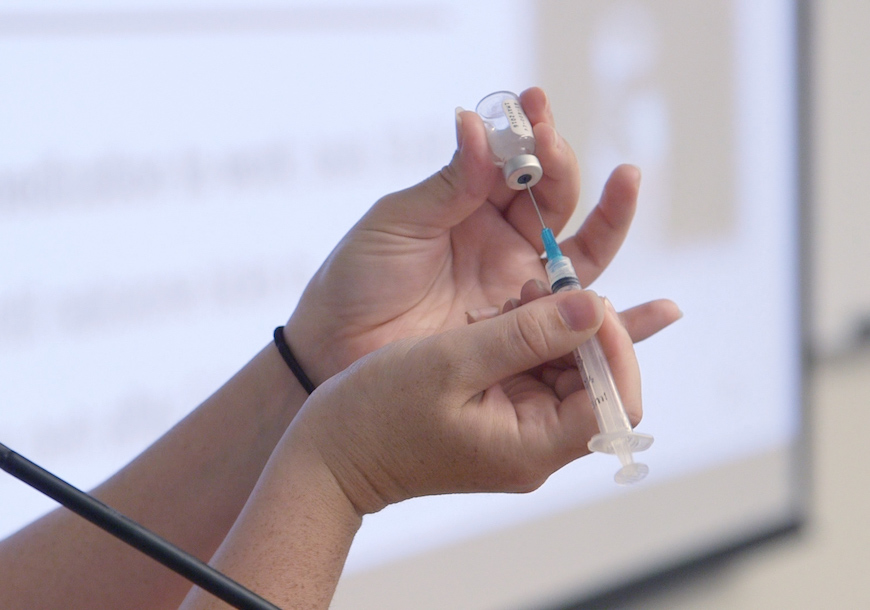
“Addiction nursing is my passion,” says Meredith Kerr, MSN (Nurs ’18), a scholarship beneficiary who volunteered as a student with the Baltimore Harm Reduction Coalition — an organization focused on reducing harmful consequences of human behavior through education, advocacy, and community engagement. Kerr plans to continue her education, become a nurse practitioner, and ultimately serve in an outpatient community clinic while still focusing on addiction issues. “It’s an area that needs a lot more help in Baltimore, and I want to help as many people as I can in my city,” she says.
The Distinguished Science of Learning Fellowship is unique in that it provides those tools to do the untalked-about things in academia, like learning how to ‘translate’ your research to make it more accessible to the general public.”
Hey, Look at That Donut!
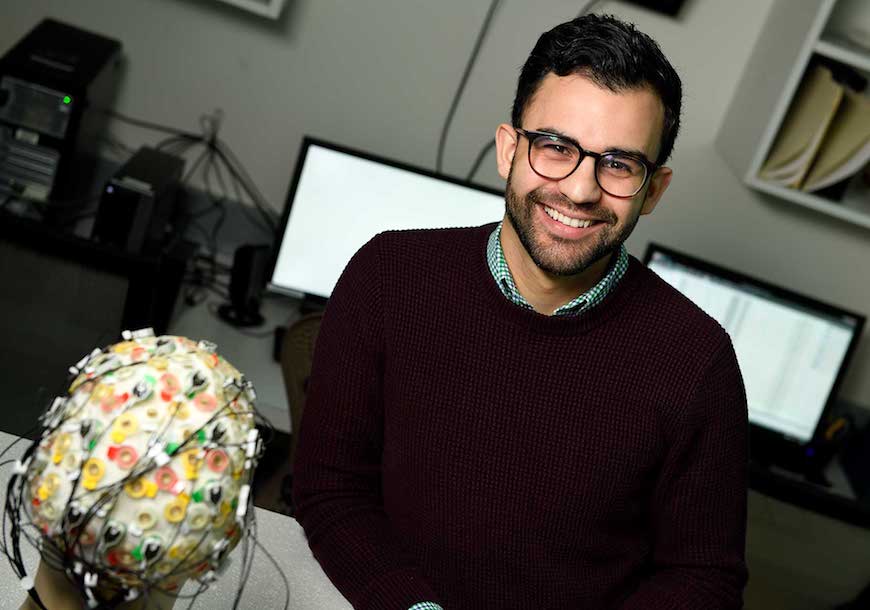
Imagine that you’re deeply engrossed in your work. A co-worker announces that there are donuts in the conference room. Do you ignore sugar’s siren call, or does it distract you? Corbin Cunningham, PhD (A&S ’18), can predict your answer. He’s spent the past two years as a Distinguished Science of Learning Fellow determining what it takes to pull someone’s attention from an engaging task, such as a video game. His early findings indicate that calorie-dense foods — donuts, steaks, ice cream — can distract us. “I’m an attention researcher, not a food researcher,” Cunningham says, “but what if someone is really engaged in a task? What role does food play in distracting someone, and does the type of food make a difference?” Those kinds of questions about dietary behavior, at the nexus of brain research and public health, are exactly the kind of interdisciplinary connections the Science of Learning Institute, funded by an anonymous gift, has sought to foster. “Typically, with neuroscience fellowships, you submit a project proposal and compete for funding, and that’s where it ends,” says Cunningham, who has since joined the medical brain team at Google. “The Distinguished Science of Learning Fellowship is unique in that it provides those tools to do the untalked-about things in academia, like learning how to ‘translate’ your research to make it more accessible to the general public.”
Recasting the narrative of Edgar Allan Poe
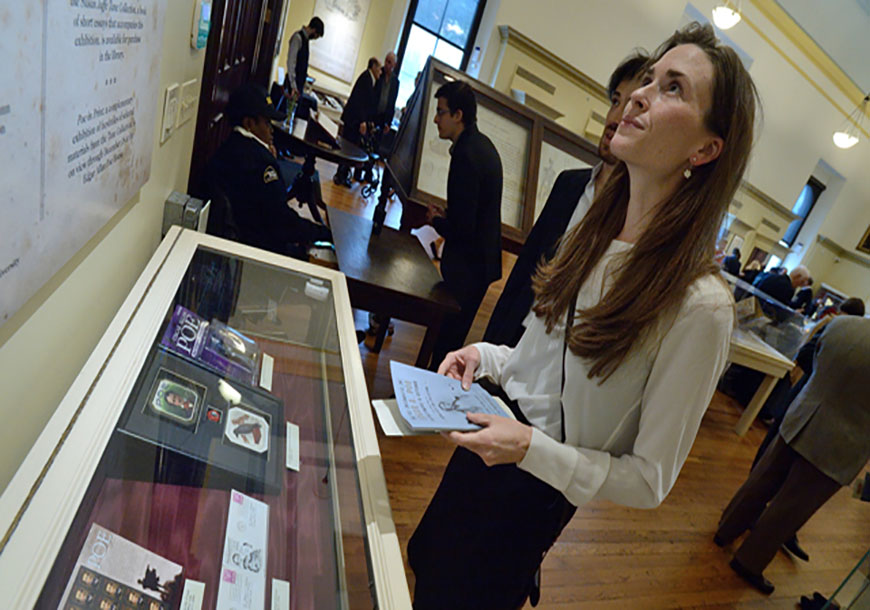
109 items — including rare books, photographs, letters and even a lock of Edgar Allan Poe’s hair. Three Krieger School doctoral students pored over these and scores of other artifacts as they crafted “The Enigmatic Edgar A. Poe in Baltimore and Beyond: Selections from the Susan Jaffe Tane Collection,” a four-month exhibition at the George Peabody Library. Their golden ticket for such access? The Denis Family Graduate Curatorial Fellowship, which provides support for graduate students to work with and receive mentoring from curators in the creation of a public exhibition hosted by the Sheridan Libraries. “Contact with a collection of this caliber invites us to think about Poe’s work in a new way,” says Gabrielle Dean, PhD, William Kurrelmeyer Curator of Rare Books and Manuscripts, who worked closely with the Denis Fellows — Abigail RayAlexander, PhD (A&S ’16), Elizabeth Brogden, PhD (A&S ’16), and Jena Whitaker, a current doctoral student. Each gained insight into the many issues Poe grappled with in his career, such as the technological aspects of publication, social networks that writers of the time relied upon, and the challenge of persuading people to read one’s work. “Making a new kind of sense out of these materials for exhibition visitors gives us the chance to rethink the basic questions that organize the field,” Dean says. André Denis, MPH (SPH ’86), A&S ’82, and his wife, Deborah — a member of the Sheridan Libraries Advisory Board — created the fellowship to express their gratitude to Hopkins and support their passion for cultural preservation. Their children, Anna Helena, A&S ’11, and Gabriel, A&S ’15, worked part-time in the Sheridan Libraries and enjoyed the exposure to rare materials. Anna Helena is now a librarian specializing in rare maps and books, and André’s brother, Rafael, A&S ’85, is an art historian and writer. “People think that rare books are dead, but they are our history and our humanity,” André Denis says. “These books survived for a reason, and we should give them the veneration they deserve.”